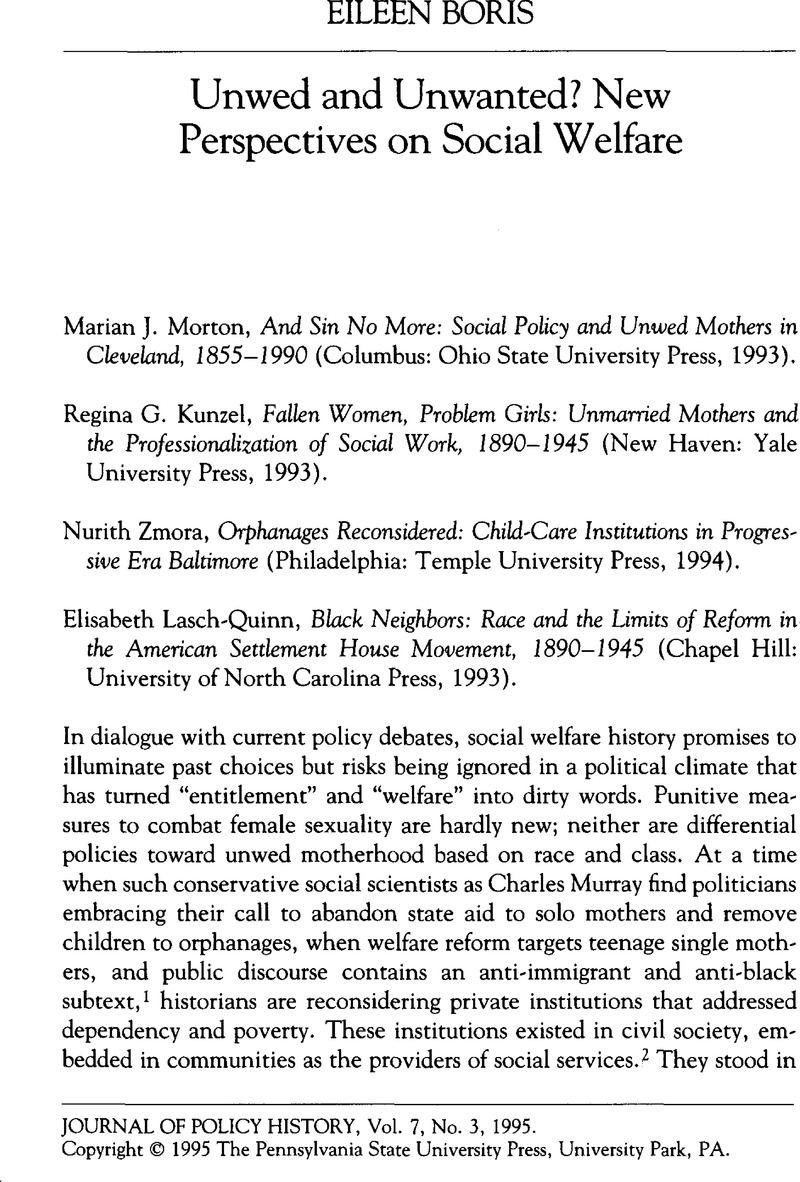No CrossRef data available.
Article contents
Unwed and Unwanted? New Perspectives on Social Welfare
Published online by Cambridge University Press: 14 October 2011
Abstract

- Type
- Review Essay
- Information
- Copyright
- Copyright © The Pennsylvania State University, University Park, PA. 1995
References
Notes
1. For example, McGrory, Mary, “Reducing Reform to Baby Talk,” Washington Post, 19 July 1994Google Scholar; Will, George, “‘Compassion’ Treats Only Welfare Symptoms,” The Daily Progress (Charlottesville, Va.), 19 June 1994Google Scholar; Thomas, Cal, “Government Can't Correct Roots of Welfare; Religious Groups Can,” The Daily Progress (Charlottesville, Va.), 19 June 1994Google Scholar; Murray, Charles, Losing Ground: American Social Policy, 1950–1980 (New York, 1984)Google Scholar; Kaus, Mickey, The End of Equality (New York, 1992)Google Scholar; for liberal implication in this trend, Amott, Teresa, “The War on Welfare: Clinton's Carrots and Sticks,” Dollars and Sense (November–December 1993): 12–15, 32–34.Google Scholar
2. For a fine discussion of civil society as a public place separate from the state but beyond the confines of our usual sense of “private” (the familial), see Evans, Sara, “Women's History and Political Theory: Toward a Feminist Approach to Public Life,” in Hewitt, Nancy A. and Lebsock, Suzanne, eds., Visible Women: New Essays on American Activism (Urbana, 1993), 119–39.Google Scholar
3. For “dependency,” see Gordon, Linda and Fraser, Nancy, “A Genealogy of Dependency: Tracing a Keyword of the U.S. Welfare State,” Signs: A Journal of Women in Culture and Society 19 (Winter 1994): 309–36.Google Scholar
4. Kunzel notes how it is time for historians to explore “the mutual constitution of ideologies of gender and race” (165). For one beginning, see Boris, Eileen, “The Racialized Gendered State: Constructions of Citizenships in the United States,” Social Politics: International Studies in Gender, State, and Society 2 (Summer 1995, forthcoming).CrossRefGoogle Scholar
5. Solinger, Rickie, Wake Up Little Susie: Single Pregnancy and Race Before Roe v. Wade (New York, 1992).Google Scholar
6. Walkowitz, Daniel J., “The Making of a Feminine Professional Identity: Social Workers in the 1920s,” American Historical Review 95 (October 1990): 1051–75.CrossRefGoogle Scholar
7. Carp, E. Wayne, “Professional Social Workers, Adoption, and the Problem of Illegitimacy, 1915–1945,” Journal of Policy History 6 (Summer 1994): 161–84, esp. 173.CrossRefGoogle Scholar
8. See the portraits offered by Peiss, Kathy, Cheap Amusements: Working Women and Leisure in Turn-of-the-Century New York (Philadelphia, 1986)Google Scholar, and Meyerowitz, Joanne J., Women Adrift: Independent Wage Earners in Chicago, 1880–1930 (Chicago, 1988).Google Scholar
9. See also Solinger, Wake Up Little Susie, 148–204.
10. For a more sustained analysis of this process, see Gordon, Linda, Pitied But Not Entitled: Single Mothers and the History of Welfare (New York, 1994).Google Scholar
11. Notable exceptions are Crocker, Ruth Hutchinson, Social Work and Social Order: The Settlement Movement in Two Industrial Cities, 1889–1930 (Urbana, 1992)Google Scholar, and Luker, Ralph E., The Social Gospel in Black and White: American Racial Reform, 1885–1912 (Chapel Hill, 1991).Google Scholar
12. See, for example, Rouse, Jacqueline Anne, Lugenia Burns Hope: Black Southern Reformer (Athens, Ga, 1989)Google Scholar; Neverdon-Morton, Cynthia, Afro-American Women of the South and the Advancement of the Race, 1895–1925 (Knoxville, Tenn., 1989)Google Scholar; Hall, Jacqueline Dowd, Revolt Against Chivalry: Jessie Daniel Ames and the Women's Campaign Against Lynching (New York, 1979)Google Scholar; Mary E. Frederickson, “‘Each One Is Dependent on the Other’: Southern Churchwomen, Racial Reform, and the Process of Transformation, 1880–1940,” in Hewitt and Lebsock, eds., Visible Women, 296–334; Lynn, Susan, Progressive Women in Conservative Times: Racial Justice, Peace, and Feminism, 1945 to the 1960s (New Brunswick, 1992), 40–67.Google Scholar




